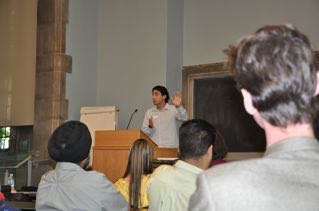What does "I don't understand" really mean?
As a teacher, I hear it quite often. "I didn't understand." It's hard not to be a little defensive, to buy into the idea that it was my fault. Somehow I didn't make the material clear enough.
Sometimes that is true, but it's rarely the case when only one or two people "don't understand." It's important to test for resistance before changing the way I teach. After all, people go along with stuff they don't understand every day. Not understanding how cars work doesn't stop us from driving and not understanding electricity doesn't stop us from using lights and computers. Not understanding grammar doesn't stop people from talking.
What "I don't understand" usually means is something more like: "I'd like to stay connected with you and I'd like to hold onto my own beliefs or limits." And that's a tough one. Because sometimes you can only invite people to the party if they're willing to agree enough to play with you. It's not that I'm unwilling to connect with people who hold other opinions about human behaviour: it's just that everyone else in the room is there to experience what I train. If getting your understanding means getting you to agree to a new point of view, that's a tall order for a short program.
As a rule of thumb, if I have explained something in two different ways and most people in a room are happy to move on, I don't explain again. The problem is probably not in understanding and more words won't make it better. Instead I focus on maintaining enough agreement so that we can try again at another time. This happens through non-verbal connection and gentle attention. And that means that the one thing I have to give up is being defensive even when someone really is implying that I should have made it easier.
Life is better for the brave than it is for people who need someone else to make it easy. I've come to understand my job as a teacher is to help people to be brave enough to explore their understanding and sometimes decide to stretch it.
Sometimes that is true, but it's rarely the case when only one or two people "don't understand." It's important to test for resistance before changing the way I teach. After all, people go along with stuff they don't understand every day. Not understanding how cars work doesn't stop us from driving and not understanding electricity doesn't stop us from using lights and computers. Not understanding grammar doesn't stop people from talking.
What "I don't understand" usually means is something more like: "I'd like to stay connected with you and I'd like to hold onto my own beliefs or limits." And that's a tough one. Because sometimes you can only invite people to the party if they're willing to agree enough to play with you. It's not that I'm unwilling to connect with people who hold other opinions about human behaviour: it's just that everyone else in the room is there to experience what I train. If getting your understanding means getting you to agree to a new point of view, that's a tall order for a short program.
As a rule of thumb, if I have explained something in two different ways and most people in a room are happy to move on, I don't explain again. The problem is probably not in understanding and more words won't make it better. Instead I focus on maintaining enough agreement so that we can try again at another time. This happens through non-verbal connection and gentle attention. And that means that the one thing I have to give up is being defensive even when someone really is implying that I should have made it easier.
 |
| One of the best teachers I know, gently challenging his audience |

Comments